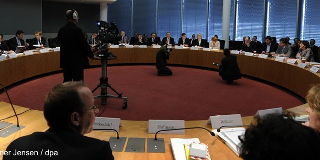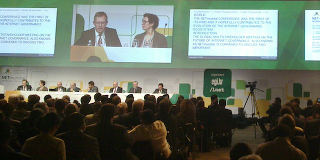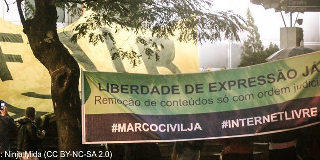NoC Internet Governance Research Project: Case Studies
These case studies are part of a globally coordinated, independent academic research pilot project by the Global Network of Internet & Society Research Centers (NoC). Facilitated by the Berkman Center for Internet & Society at Harvard University, this study examines existing multistakeholder governance groups with the goal of informing the future evolution of the Internet governance ecosystem. Building upon the NETmundial Principles and Roadmap, it contributes to current policy debates at the international level, including the Internet Governance Forum, the NETmundial Initiative, and other organizations and efforts.
Internet governance is an increasingly complex concept that operates at multiple levels and in different dimensions, making it necessary to have a better understanding of both how multistakeholder governance groups operate and how they best achieve their goals. With this need in mind, at a point where the future of Internet governance is being re-envisioned, colleagues from several NoC institutions around the world have written twelve case studies examining a geographically and topically diverse set of local, national, and international governance models, components, and mechanisms from within and outside of the sphere of Internet governance. Key findings from these cases are summarized in a synthesis paper, which aims to deepen our understanding of the formation, operation, and critical success factors of governance groups and even challenge conventional thinking.
The research, based on twelve case studies, suggests that there is no single best-fit model for multistakeholder governance groups that can be applied in all situations. Rather, it reveals a range of approaches, mechanisms, and tools available for both the formation and operation of such groups. The analysis demonstrates that the success of governance groups depends to a large degree on the careful selection, deployment, and management of suitable instruments from this “toolbox.” As governance groups pass through different phases of operation, conveners and facilitators must remain alert to changes in circumstances that necessitate adjustments to the approaches, mechanisms, and tools that they deploy in order to address evolving challenges from inside and outside. These case studies provide insights into how those instruments can be deployed and adjusted over time within such groups, and highlight how their interactions with important contextual factors may be successfully managed within given resource restraints.
The research effort is grounded in a diversity of global perspectives and collaborative research techniques. Adhering to objective and independent academic standards, it aspires to be useful, actionable, and timely for policymakers and stakeholders. More broadly, the Network of Centers seeks to contribute to a more generalized vision and longer-term strategy for academia regarding its roles in research, facilitation and convening, and education in and communication about the Internet age.
For additional information on the initiative, please contact Urs Gasser, Berkman Center for Internet & Society, at ugasser@cyber.law.harvard.edu.
Photo Teaser: picture alliance / pixsell

Enquete-Kommission Internet und digitale Gesellschaft (Enquete Commission on Internet and Digital Society)
This case study by the Humboldt Institute for Internet and Society (HIIG) examines the Enquete Commission on Internet and Digital Society (EIDG), a special parliamenta...

Fighting Spam the Multistakeholder Way – A Case Study on the Port 25/TCP Management in the Brazilian Internet
This case study by the Institute for Technology & Society at Rio de Janeiro State University explores how CGI.br, the multistakeholder Brazilian Internet Steering Comm...

Turkish Internet Improvement Board
This case study by the IT Law Institute, Istanbul Bilgi University focuses on a multistakeholder working group that the Turkish Internet Improvement Board created in o...

Swiss ComCom FTTH Roundtable
This case study by the Berkman Center for Internet & Society at Harvard University explores the dimensions of how the Swiss government used a multistakeholder process ...

The Global Multistakeholder Meeting on the Future of Internet Governance (NETmundial)
This case study by the Center for Technology & Society at the FGV School of Law, Rio de Janeiro examines NetMundial, the 2014 Global Multistakeholder Meeting on the Fu...

Aviation – The Worldwide Slot Guidelines
This case study by the European University Institute, Florence explores the history and evolution of the Worldwide Slot Guidelines, an international set of agreements ...

The Evolution of Governance Structure in Cryptocurrencies and the Emergence of Code-Based Arbitration in Bitcoin
This case study by the Hans-Bredow-Institute, University of Hamburg describes how Bitcoin, the open source cryptocurrency, revised its core code to accommodate a new f...

Creative Commons (CC)
This case study by the Nexa Center for Internet & Society, Politecnico di Torino examines the formal structure of Creative Commons as an organization stewarding the de...

Multistakeholder Approaches to Water Resource Management in the White Volta River Basin
This case study by the Berkman Center for Internet & Society at Harvard University examines and compares the international deployment of the decentralized integrated w...

Multistakeholder Governance and Nodal Authority – Understanding Internet Exchange Points
This case study by the European University Institute and the Philosophy Department, Uppsala University considers Internet Exchange Points (IXPs) as an example of gover...

Towards a Cyber Security Policy Model – Israel National Cyber Bureau (INCB) Case Study
This case study by the Haifa Center of Law and Technology (HCLT), University of Haifa Faculty of Law follows the creation of a cyber security policy model at the natio...

A Bill of Rights for the Brazilian Internet (“Marco Civil”) – A Multistakeholder Policymaking Case
This case study by the Institute for Technology and Society at Rio de Janeiro State University explores the events that led to the passing of the “Marco Civil da Inter...
